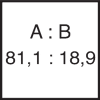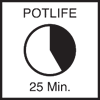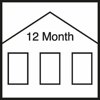Article No. 683425
Pigmented roller coating (high build coating)
Product specifications
Component A
Component B
Mixture
Once fully cured
* Epoxy resin mortar 1 : 10 with standard sand
The stated values represent typical product characteristics and are not to be construed as binding product specifications.
Field of application
- Primer and roller coating in the high build coat system
Properties
- Can be subjected to mechanical loads
- Can be subjected to chemical loads
- Coating compatibility test
- Physiologically harmless once fully cured
-
Preparation
-
Substrate requirements
The substrate must be firm, dimensionally stable, capable of bearing loads and free of loose constituents, dust, oil, grease, rubber marks and other substances that could interfere with adhesion.
The tensile strength of the surface of the substrate must be at least 1.5 N/mm² on average (smallest individual value of at least 1.0 N/mm²), and the compressive strength must be at least 25 N/mm².
-
Preparations
Prepare the substrate by suitable means, e.g. steel ball jetting or diamond grinding, so that it meets the requirements specified above.
Broken-out or missing areas in the substrate should be filled flush with the surface using Remmers RM systems (RM = Repair Mortar) or Remmers EP mortars.
-
-
Preparation
-
Combination container
Add the entire quantity of the hardener (component B) to the base compound (component A).
Mix thoroughly with a slow-speed electric mixer
(approx. 300 - 400 rpm).Pour the mixture into a separate container and mix again thoroughly.
Mix for at least 3 minutes.
Insufficient mixing is indicated by streaks forming.
-
Application
-
Setting may be accelerated by adding ACC H. The associated directions for use are available upon request.
As a general principle, higher temperatures will reduce and lower temperatures will increase the times stated.
-
Working tools / cleaning
-
Epoxy roller, rubber squeegee, suitable mixing equipment
-
More detailed information can be found in the Remmers Tool Programme.
Clean tools, equipment and splashed material immediately while fresh with V 101.
Take suitable protective and waste disposal measures when cleaning.
-
Storage / shelf life
-
If stored unopened in the original container and kept cool, dry and protected from frost, min. 12 months (component A)/min. 24 months (component B).
-
Usage
-
See application examples
-
-
Application examples
-
HBCS
Pour the material onto the prepared surface, spread evenly using a rubber scraper, then roll crossways using a suitable epoxy roller.
Two coats must be applied.
Approx. 0.3 kg/m² of binder per coat (depending on the substrate)
-
-
General information
-
Unless otherwise specified, all of the values and application rates given above have been determined under laboratory conditions (20 °C) using standard colours. Slight deviations from these values may arise if the product is worked with on site.
Due to the thin-layer build-up, blasting or grinding traces or the texture of the substrate might be visible.
When coating continuous surfaces, only use materials with the same batch number as slight differences in colour, gloss and texture may occur.
Shades of colour with low hiding power (e.g. yellow, red or orange) tend to have a translucent effect on the subsequently applied sealant. In such cases, a colour-coordinated construction, e.g. light grey, is necessary.
It may be necessary to apply several layers.
If dark or highly pigmented colours are used it is possible that, even with very careful application, shadows or light textures appear on the surface. This is due to the product system and does not in any way affect product suitability. In case of doubt set up a trial surface.
In case of repairs on the surface or working up to existing surfaces, there will be a visible transition in appearance and texture.
Suitable for vehicle traffic with rubber tyres; not suitable for vehicle loads with metal or polyamide tyres nor for dynamic point loads.
Abrasive mechanical loads leave traces of wear.
Epoxy resins are generally not colourfast when exposed to UV light or weather.
Further notes on working, system construction and maintenance of the listed products can be found in the latest Technical Data Sheets and the Remmers system recommendations.
-
-
Disposal instructions
-
Larger quantities of leftover product should be disposed of in the original containers in accordance with the applicable regulations. Completely empty, clean containers should be recycled. Do not dispose of together with household waste. Do not allow to enter the sewage system. Do not empty into drains.
-
-
Safety / regulations
-
For professional users only!
For further information on the safety aspects of transporting, storing and handling the product and on disposal and environmental matters, please see the current Safety Data Sheet and the brochure entitled "Epoxy Resins in the Construction Industry and the Environment", issued by Deutsche Bauchemie e.V. (3rd edition 2022).
-









